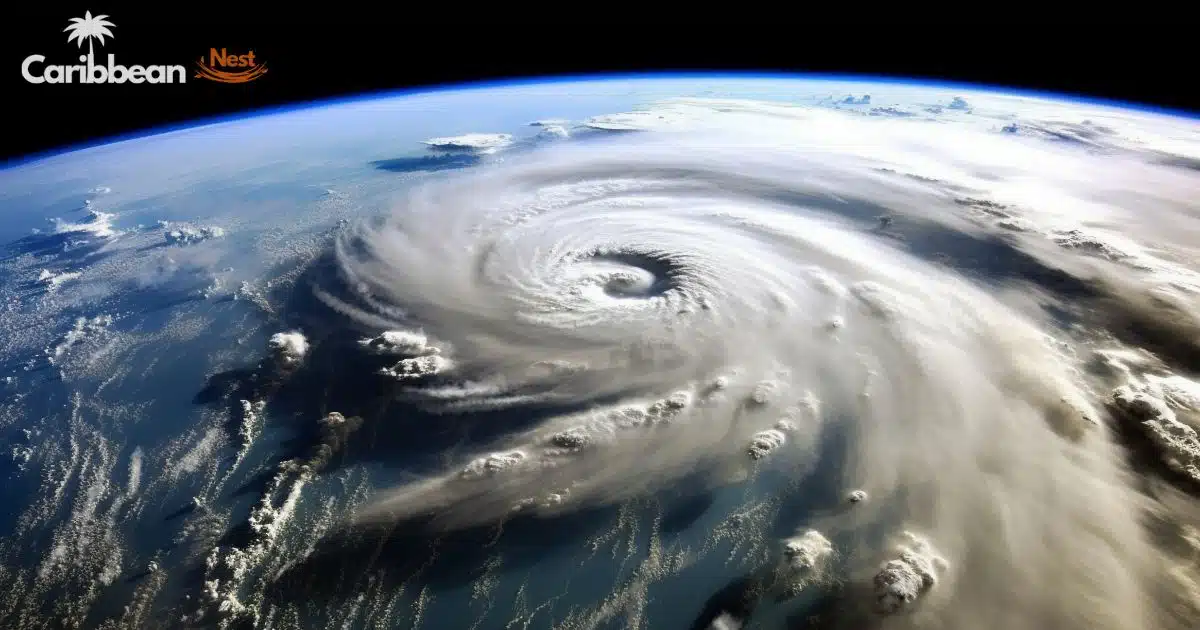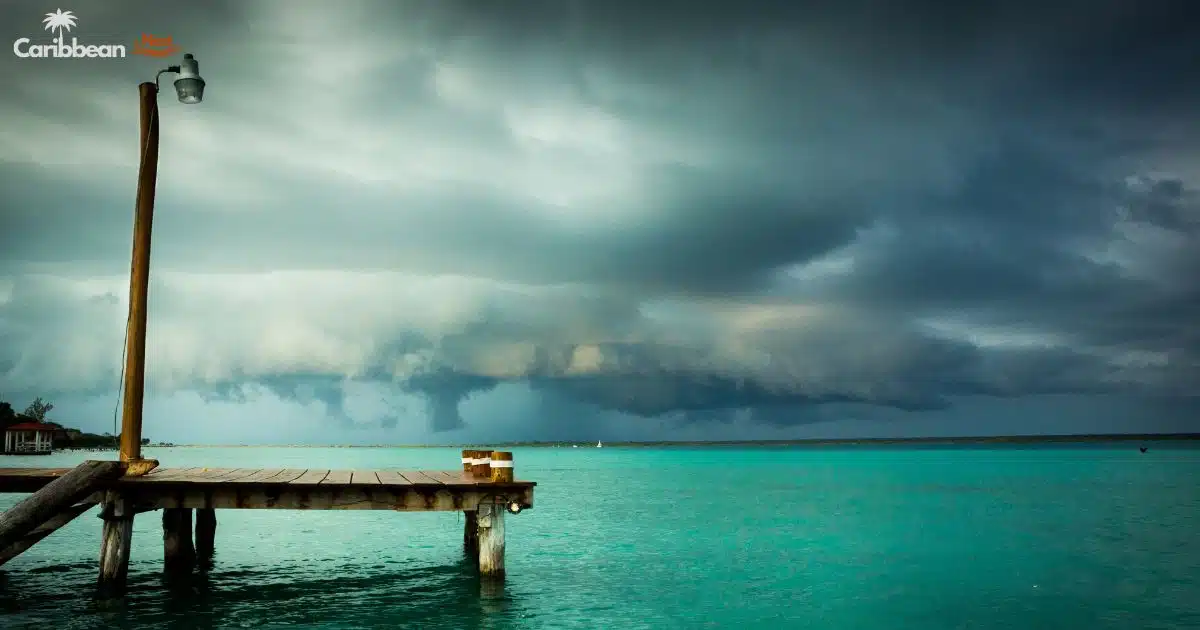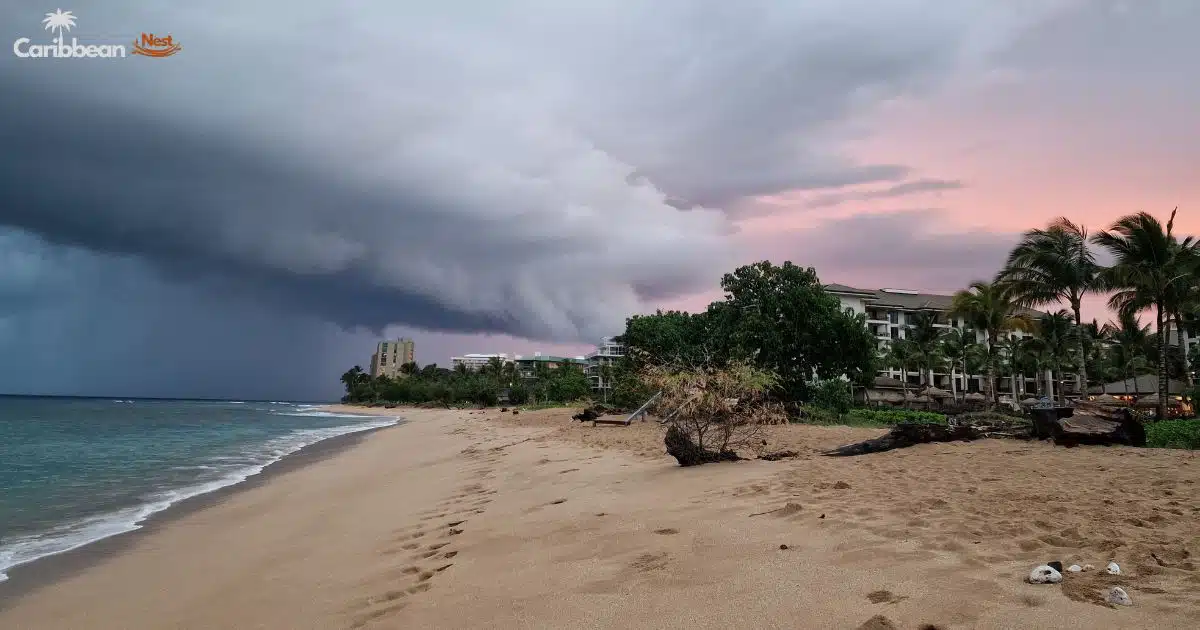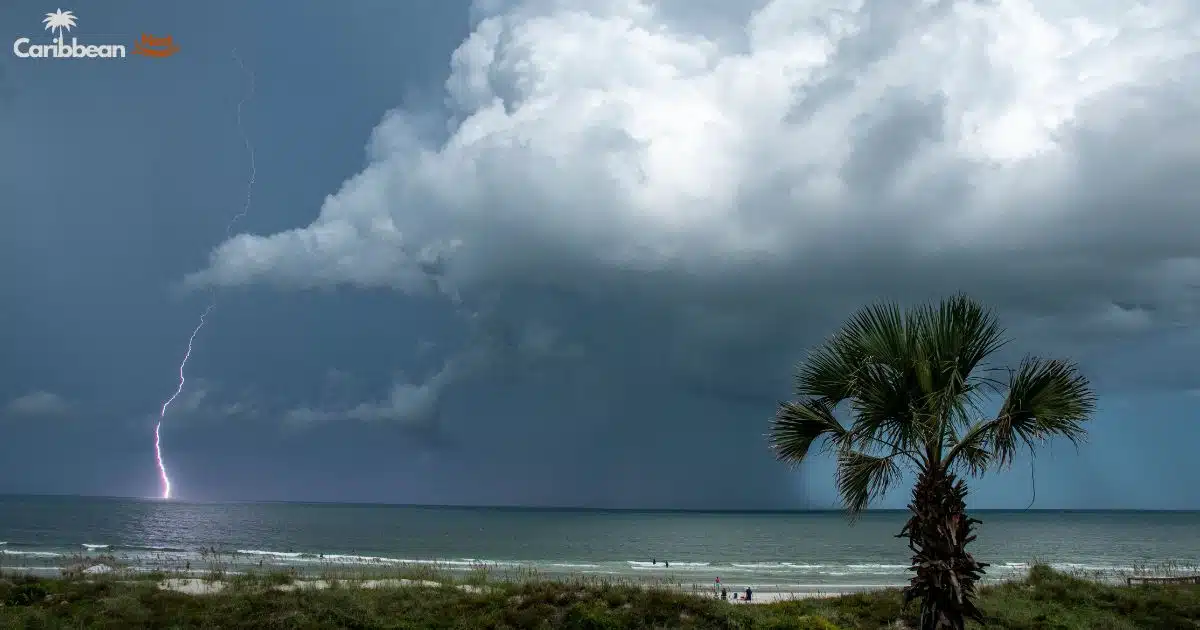Aruba is a popular destination for travellers seeking year-round sunshine. Still, if you’re considering a trip during the Aruba Hurricane Season, you might have concerns about storms. Fortunately, Aruba’s unique location makes it a haven during the Caribbean storm season. Unlike many other islands in the region, Aruba lies outside the hurricane belt, significantly reducing its risk of direct impacts from major storms.
While the island does experience its rainy season, the weather remains relatively mild, with brief showers that rarely disrupt plans. Whether you’re visiting for a relaxing beach vacation or exploring the local culture, Aruba’s tropical weather ensures a pleasant experience even during the storm season.
Introduction to Aruba’s Climate and Hurricane Season
Aruba is located in the southern Caribbean Sea, just outside the main hurricane belt. This means that although the Caribbean hurricane season runs from June 1 to November 30, Aruba faces significantly less risk from tropical storms than many other islands in the region. While it’s essential to be aware of the weather extremes that can occur during the season, the reality is that Aruba’s location provides a natural shield against many storms.
Unlike other Caribbean islands, Aruba’s weather is mostly consistent year-round. Even during the Aruba rainy season, the island experiences brief, light rain showers that rarely disrupt your holiday plans. Aruba’s geographic position, combined with its storm preparedness, makes it one of the safest destinations during hurricane season.
What is Aruba’s Hurricane Season?
Aruba’s hurricane season coincides with the broader Caribbean hurricane season, which runs from June to November. During this time, the Atlantic Ocean sees an increase in tropical storm activity. However, due to Aruba’s unique location south of the hurricane belt, the island is less prone to direct hits from hurricanes and tropical depressions. The island may experience some effects, such as increased rainfall, but major storms rarely affect the island.
Most tropical storms that occur in Aruba are brief and mild. Aruba’s storm history reveals that only a handful of notable storms have impacted the island, causing minimal damage. The Aruba hurricane forecast typically predicts only light to moderate weather disruptions for the island.
Is Aruba Really Outside the Hurricane Belt?
Aruba is often praised for being outside the hurricane belt, a region where tropical storms and hurricanes tend to develop. This fortunate positioning means that the island has a very low chance of direct hurricane impacts. While other Caribbean destinations may see hurricanes more frequently, Aruba’s risk of flooding and severe weather is much lower.

15 Essential Packing Items for Aruba in 2026
Packing smart for Aruba is key to a stress-free trip. From reef-safe sunscreen to lightweight clothes and comfy footwear, having the right essentials keeps you ready for sunshine, culture, and adventure in this Caribbean paradise.
The Reality of Aruba’s Storm Season: Are Hurricanes Common?
Although hurricanes in Aruba are infrequent, tropical storms can occasionally occur in the Caribbean during the storm season. However, these storms are often mild and don’t bring the intense winds or flooding typically associated with hurricanes. For the most part, travellers can expect warm, sunny days with occasional showers, especially during the Aruba rainy season.
Historically, Aruba has managed to avoid severe tropical weather patterns. Even during the peak of storm season in the Caribbean, the island remains largely unaffected, thanks to its strategic location. So, while it’s possible to experience some rain, major disruptions are uncommon, and Aruba’s resilience against storms is remarkable.
How does the Weather look during Aruba’s Hurricane Season?
During hurricane season, Aruba experiences mild rain showers and cloudy days, but they are typically short-lived. The island’s tropical weather remains warm, with temperatures ranging from the mid-80s to low 90s°F (around 27-32°C). Unlike other regions, the rain often falls in the early morning or evening, leaving most of the day sunny and perfect for outdoor activities.
While Aruba experiences slight rainfall increases during hurricane season, it rarely results in the prolonged wet weather typically found in other parts of the Caribbean. As a result, Aruba’s off-peak travel period is an excellent time to visit if you’re seeking a quieter, more budget-friendly getaway.
What Happens if a Storm Approaches Aruba?
Though rare, there’s always a possibility of a storm approaching Aruba. The good news is that Aruba is well-prepared for such events. Local authorities closely monitor the weather, and Aruba storm warnings are issued promptly if a threat is detected. In the unlikely event that a storm approaches, the island has robust emergency measures in place, including evacuation plans and emergency shelters.
Tourists are also informed well in advance about any potential storm threats. The island’s Aruba storm tracking system ensures that visitors are kept informed about the latest weather updates in Aruba. Travellers are encouraged to stay informed and follow the safety instructions provided by local authorities during any storm threats.
The Impact of Climate Change on Aruba’s Storms and Rainfall
Like many regions, Aruba’s climate is being affected by global warming. Aruba’s climate change impact could lead to stronger storms, more intense rainfall, and shifts in weather patterns over time. While tropical cyclones in Aruba remain rare, the island is not immune to the effects of climate change.
Aruba’s tropical weather patterns could shift, leading to increased rainfall or stronger storms. As the Aruba storm season continues to evolve, travellers should be aware of these potential changes and always check the Aruba hurricane forecast before travelling. This helps ensure that vacationers can stay flexible and prepared for any unexpected weather developments.
Should You Visit Aruba During Hurricane Season?
Visiting Aruba during hurricane season comes with both benefits and considerations. One of the major advantages is the lower cost of travel. Aruba off-peak travel can save you money on flights, accommodations, and activities. Plus, with fewer crowds, you’ll enjoy a more peaceful vacation.
While the island is generally safe, travellers should remain aware of potential storms. The possibility of Aruba experiencing weather anomalies is low. Still, it’s always a good idea to have travel insurance and stay informed about potential storm disruptions in Aruba. For many, Aruba’s status as a safe travel destination during storm season makes it an appealing choice, thanks to its consistent sunny weather and excellent preparedness.
Tips for Safe and Enjoyable Travel
For a safe and enjoyable trip during Aruba’s hurricane season, it’s important to stay flexible. Book flights and accommodations that allow for easy changes, and always purchase Aruba weather insurance that covers weather-related disruptions. Having an emergency plan, knowing local Aruba emergency contacts, and being aware of Aruba storm shelters will give you peace of mind.
It’s also a good idea to familiarise yourself with Aruba storm activity predictions and regularly check the Aruba weather forecast. This way, you can make the most of your vacation while staying safe in the event of any potential weather changes. Be sure to plan indoor activities and cultural experiences to keep things fun in case of unexpected rain.
How to Monitor Storm Warnings and Stay Informed?
Staying updated on Aruba storm warnings is essential for travellers during hurricane season. Local authorities provide timely weather alerts, and numerous apps and websites are dedicated to tracking tropical storms in Aruba. Aruba storm tracking allows you to monitor any weather systems approaching the island, so you’re always in the know.
Consider subscribing to local weather channels and downloading storm tracking apps to receive real-time updates. This ensures you’re ready for any changes in Aruba’s tropical weather patterns, helping you to adjust your plans and stay safe.
Conclusion
The Aruba hurricane season is not something to worry about. Thanks to the island’s strategic location outside the hurricane belt, it remains one of the safest destinations in the Caribbean. Aruba’s resilience against storms and the island’s advanced storm preparedness systems mean that even during storm season, visitors can enjoy their vacation with little concern.
While it’s always good to stay informed and prepared, the risk of a direct impact from a hurricane is extremely low. With careful planning and the right precautions, travelling to Aruba during hurricane season can be a safe, affordable, and rewarding experience.
FAQ’s
1. Is there a bad time of year to go to Aruba?
Aruba is a great destination year-round. However, visiting during hurricane season (June to November) may offer lower costs and fewer crowds, with minimal risk of major storms.
2. How often does Aruba get hit by a hurricane?
Hurricanes rarely affect Aruba. The last significant storm was in 2007, and Aruba’s position outside the hurricane belt reduces the chances of a direct hit.
3. What is the rainy season in Aruba?
Aruba’s rainy season typically occurs from October to January. However, the rain is usually brief and doesn’t significantly impact travel plans.
4. What months are the worst for hurricanes in the Caribbean?
The peak months for hurricanes in the Caribbean are August through October, with September being the most active period for hurricane season.
5. Which Caribbean island is safest from hurricanes?
Aruba is considered one of the safest Caribbean islands during hurricane season due to its location outside the hurricane belt.








